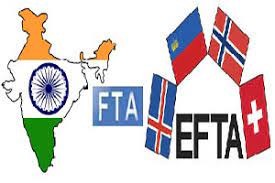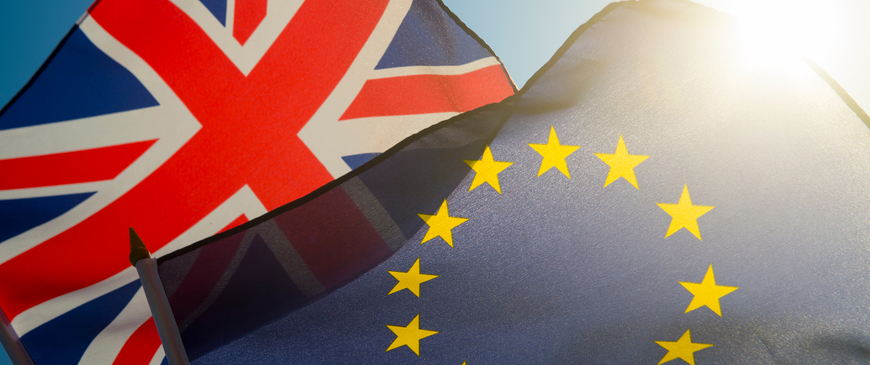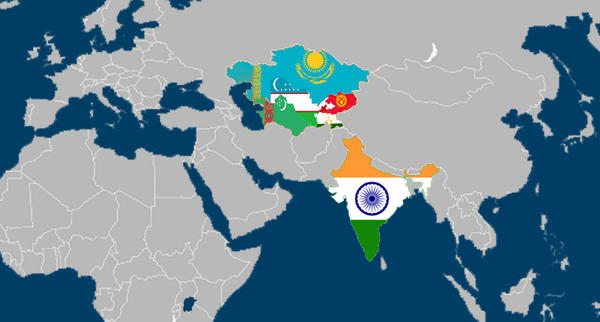- Courses
- GS Full Course 1 Year
- GS Full Course 2 Year
- GS Full Course 3 Year
- GS Full Course Till Selection
- MEP (Mains Enrichment Programme) Data, Facts
- Essay Target – 150+ Marks
- Online Program
- GS Recorded Course
- NCERT- First Ladder
- Polity
- Geography
- Economy
- Ancient, Medieval and Art & Culture AMAC
- Modern India, Post Independence & World History
- Environment
- Governance
- Science & Technology
- International Relations and Internal Security
- Disaster Management
- Ethics
- Current Affairs
- Indian Society and Social Issue
- CSAT
- 5 LAYERED ARJUNA Mentorship
- Public Administration Optional
- ABOUT US
- OUR TOPPERS
- TEST SERIES
- FREE STUDY MATERIAL
- VIDEOS
- CONTACT US
India and EFTA
India and EFTA

Latest Context
Very recently, India and the four European countries that form the European Free Trade Association (EFTA) have been engaged in negotiations for a Trade and Economic Partnership Agreement (TEPA) that has been stalled since 2018.
- The objective is to enhance bilateral trade and economic cooperation between the two regions by slashing tariffs and non-tariff barriers, enhancing market access, and promoting investment flows.
Information about EFTA
- EFTA, established in 1960, is an intergovernmental organization. It is an alternative trade bloc for those European states that were unwilling or unable to join the European Union (EU).
- It includes Iceland, Liechtenstein, Norway, and Switzerland. Though, these countries are not part of the EU but have access to its single market through various agreements.
- It is India's 9th largest trading partner that accounts for about 2.5% of India's total merchandise trade in 2020-21. Textiles, chemicals, Gems, jewelry, machinery, and pharmaceuticals are India's main export items to EFTA. India imports machinery, chemicals, precious metals, and medical instruments from EFTA.
Information about TEPA
-
Objective:
The objective of TEPA is to create opportunities for trade and investment between India and EFTA by eliminating/slashing tariffs and non-tariff barriers on a wide range of products. Furthermore, it aims to ensure fair and transparent market access conditions for service providers and investors that will enhance cooperation on intellectual property rights protection and enforcement. It aims to facilitate trade procedures and customs cooperation coupled with effective mechanisms for dispute resolution.
-
Coverage:
It is a comprehensive agreement that includes trade in goods, trade in services, investment, intellectual property rights, competition, government procurement, trade facilitation, trade remedies, dispute settlement, and other areas of mutual interest.
-
Recent Highlights:
Participating countries accepted challenges posed by the global economic and trade environment. They agreed to resolve the bilateral trade and economic partnership issues by adopting a constructive and pragmatic approach. Furthermore, India proposed to have a dialogue on gender equality and women empowerment in TEPA negotiations. India is determined to promote social development along with economic growth.
India’s Relations with EFTA Countries
-
India and Switzerland Relations:
An inter-governmental framework agreement on technical and scientific cooperation was signed that leads to the launch of the Indo-Swiss Joint Research Program. A skill training collaboration between both countries is promoted through institutes such as the Bhartiya Skill Development Campus and University, the Indo-Swiss Centre of Excellence in Pune, and the Vocational Training Center in Andhra Pradesh. Switzerland is the 12th largest investor in India, accounting for 1.07% of total FDI in India from April 2000 to September 2019.
-
India and Norway Relations:
India-Norway Task Force on Blue Economy for Sustainable Development was inaugurated in 2020. More than 100 Norwegian companies have been established in India. The Norwegian Pension Fund Global is one of India's largest single foreign investors. There is an academic collaboration that exists between the Indian Institute of Technology-Madras and the Institute of Wind Energy in Chennai with institutions in Norway. The Norwegian company, Piql, have been involved in creating a digital archive for Indian monuments.
-
India and Iceland Relations:
Iceland and India established diplomatic relations in 1972 and have strengthened their ties since 2005 with high-level visits and exchanges. Both countries share common values of democracy, the rule of law, and multilateralism. Most importantly, Iceland supports India's candidature for a permanent seat at the UN Security Council. Iceland and India cooperate in trade, renewable energy, science and technology, education, culture, and development. Various agreements have been signed between the two countries to facilitate economic cooperation, such as a Double Taxation Avoidance Agreement.
-
India and Liechtenstein Relations:
Both countries have friendly relations based on mutual respect and cooperation. Bilateral trade between the two countries is modest, amounting to US$ 1.59 million in 2016-17. Both countries have exchanged high-level visits to strengthen their ties.
In addition. the two countries have signed agreements to facilitate economic cooperation, such as a Double Taxation Avoidance Agreement. Liechtenstein supports India's candidature for a permanent seat at the UNSC.




